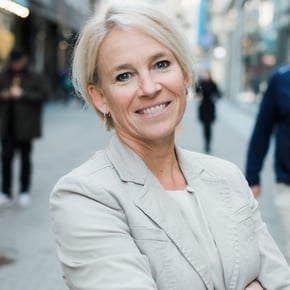The endoscopy project in Stockholm was initiated by a working group consisting of endoscopists and colorectal surgeons responsible for the colorectal cancer process in the region. The project was funded by the Regional Cancer Centre Stockholm-Gotland (RCC), with the aim to shorten waiting times in cancer care. Annika Sjövall, colorectal surgeon and process leader for the colorectal cancer process, was responsible for ensuring the introduction of standardized care process for colorectal cancer in the region. The process from diagnosis was already well defined, but the preceding stages, from suspicion to diagnosis, needed revision.
The main objective of the project was to map and understand the care process, lead times, quality and volumes linked to the colonoscopy care process. Another objective for the project was to introduce quality indicators in the colonoscopy report. Furthermore, the project aimed to establish a structure for the continuous quality improvement of colonoscopies and forecast the need for colonoscopies in the Stockholm region over the next ten years.
The targets of the project were:
-
Waiting time ≤10 calendar days
-
Standardized colonoscopy referrals
-
Standardized colonoscopy report
-
Mapping of Stockholm's current colonoscopy resources
-
Increased flexibility and patient participation
-
Increased quality of performance
-
Forecast of need for colonoscopy resources in Stockholm
-
Follow-up of reporting care process lead times
A steering group was set up consisting of a surgeon and process leader for the colorectal cancer process, as well as three representatives of endoscopy units in hospitals and a private actor. Two project managers from Centigo were engaged. The project managers and steering group carried out surveys and developed proposals for solutions that were presented to a reference group. The reference group comprised specialist experts (Spesak ) and the regional gastroenterological advisory board, which consists of representatives from all gastroenterological units and endoscopy units within Region Stockholm. The members of the reference group implemented the proposals in their home units. "A large part of the sucess of the project could be explained by the dialogue and exchange of experience on challenges and different perpsectives among the participants," says Anna Orbe, project manager from Centigo.
Change management a key to success
The project included transfer of responsibility for continued work on quality improvement, including structured quality data and the training of endoscopists. Change management was part of the project's success.
On three occasions the project organized meetings with representatives from endoscopy units, both private and public operated, the regional health care administration (HSF), primary care, representatives from colorectal cancer screening and medical informatics. The meetings contributed to the exchange of experiences and an increased understanding of the various difficulties, opportunities, and challenges. The project managers supported the different units in the introduction of the improved referrals and uniform quality indicators.
Project objectives
Project Objective 1 - Waiting time ≤10 calendar days
At the start of the project, lead times were monitored, by using a code in the patient record. This worked poorly. Useful figures could not be obtained in the year 2016. In March 2018, a standardized care process register was impemented on the INCA platform, the data platfrom where cancer redords are kept. The register enabled monitoring of several different lead times within the standardized care process. Easy access to data contributed to endoscopy units reviewing theit colonscopy care process and lead to shortened waiting times.
Project Objective 2 - Standardized colonoscopy referrals
Primary care needed support in implementing standardized care process for all cancer diagnoses. Endoscopy units wanted a higher quality in colonoscopy referrals. Collaboration between primary care, endoscopists and the medical records system administration, a standardized referral was created that set out the criteria for well-founded suspicion. All units in the region have now implemented the standardized referral. This enables the evaluation of which criteria of well-founded suspicion have led to a cancer diagnosis. This is valuable for future revision of the criteria.
Project objective 3 - Standardized colonoscopy report
Several hospitals used their own template design for colonoscopy reports. The project focused on introducing four basic quality indicators: bowel cleanliness (according to Boston bowel preparation score), percentage of complete colonoscopy (caecal intubation rate), examination time (minimum of six minutes), and detection of adenomatous polyps (adenoma detection rate). A medical record template containing these quality measures was used at Danderyd’s Hospital in Stockholm. The project supported the implementation of the report template across the region. At present, it is used by most endoscopy units in the region and current quality data can therefore easily be obtained at unit and endoscopist level.
Project objective 4 - Mapping of Stockholm's current colonoscopy resources
The mapping of resources and completed endoscopies per unit showed that over 40,000 colonoscopies are made annually in the Stockholm region. This figure is sufficient for todays need, but has to be recalculated for tomorrows increasing needs due to the population growth in the region.
Project objective 5 - Increased flexibility and patient participation
The project investigated the possibility for patients themselves to book a time for their colonoscopy using a web calendar and the possibility to cancel and rebook a given appointment online.
Both proposals have the potential to increase flexibility for the patient and therefore their participation in their care. In light of a new digital care information system that was due to be implemented in Region Stockholm, this activity was paused.
Project objective 6 - Increased quality of performance
To ensure the continued skills development of endoscopists in the region, the project established a train-the-trainer concept. Three colonoscopy educational train the trainer concept courses were conducted with English instructors. The courses focused on practical clinical training in colonoscopy techniques with direct feedback to the participants. The courses, and a standardized colonoscopy report with searchable and measurable quality indicators, are important parts of quality improvement in the region.
Some units that have introduced quality indicators, have discovered individual differences in the quality of the endoscopies performed. This has allowed management to provide targeted support measures at an individual level.
The structure and responsibility for this concept has now been transferred to the gastroenterological advisory board.
Project objective 7 – Forecast of need for colonoscopy resources in Stockholm
Stockholm is growing every year and so is the need for colonoscopies. The project established that with the same rate of increase as in the last 20 years, Stockholm will need 60,000 colonoscopies in 2029. This means that the region will require 30–40 more endoscopists than at present.
Project objective 8 - Follow-up of reporting care process lead times
The project managers investigated the need for administrative support at endoscopy units to complete reporting in the care process register. Information about the possible need for additional administrative resources was sent to all units. Reporting to the care process register increased significantly during the project. At present, the register works well for all patients diagnosed with colorectal cancer. There is still potential for improvement regarding those patients who do not have cancer and thus end their standardized care process at the endoscopy units.
Health economic calculation
Cost-effectiveness was analyzed based on the quality-enhancing measures presented by the project group and the cost was set in relation to the expected effect. The health economic analysis is a cost-impact assessment for the Stockholm region, based on a health and medical care perspective and includes only direct costs.
Quality-enhancing measures in the form of training of endoscopists are expected to reduce the incidence of serious complications during colonoscopy, such as bleeding, perforation, splenic injuries, and death. The estimated cost saving for for the absence and reduced incidence of serious complications are SEK 3.5 million per year, as well as 76 saved life years and 62 quality-adjusted life years. In a context of continuing education, these SEK 3.5 million could pay for 222 education opportunities per year.
The project also included work on standard referrals, aiming to reduce the number of colonoscopies performed that do not have an adequate indication. Previous studies show that 20–40% of all colonoscopies are performed without adequate indication (5,6,7). If quality-enhancing work can reduce that proportion, it will result in large cost savings. Assuming that the number of colonoscopies could be reduced by 30%, an additional SEK 55 million could be released for qualitative care per year.
These savings could fund the training and meet the expected increase in colonoscopy need in the region.
Work methodology for increasing collaboration and joint development
We believe that the Endoscopy project could be used as a generic model for improved collaboration and work for regional and national care quality improvement.
The project and the independent project managers from Centigo created the conditions for collaboration between all endoscopy units within the Stockholm region. At meetings, common important themes were discussed, results were presented, which lead to activities between the meetings.
The project leaders from Centigo wish to highlight the methodology for quickly achieving consensus and development to improve quality. Different units lead the way by testing, creating an increased understanding, and inspired the others to implement.
Collaboration in general is often a challenge in Swedish healthcare, due to many levels of care providers and fragmented responsibility for the patient process. Collaboration requires that the system being developed is defined and that the objectives of the project are clear. The focus of the project was initially equal care and a defined waiting time. The project also agreed on that implementation of training and quality measures could create better conditions for increased care quality. Annika Sjövall states that when several units meet to jointly solve specific problems, the networks created can often achieve even more positive effects than those initially thought of. Anna Orbe, who was one of the project managers from Centigo, says that as an outside project manager, you can add a "neutral basis" for discussing challenging topics, that can be difficult otherwise.
In collaboration with the endoscopy project Swecare has published an interactive brochure, Treating and Defeating Cancer - the Swedish way.


